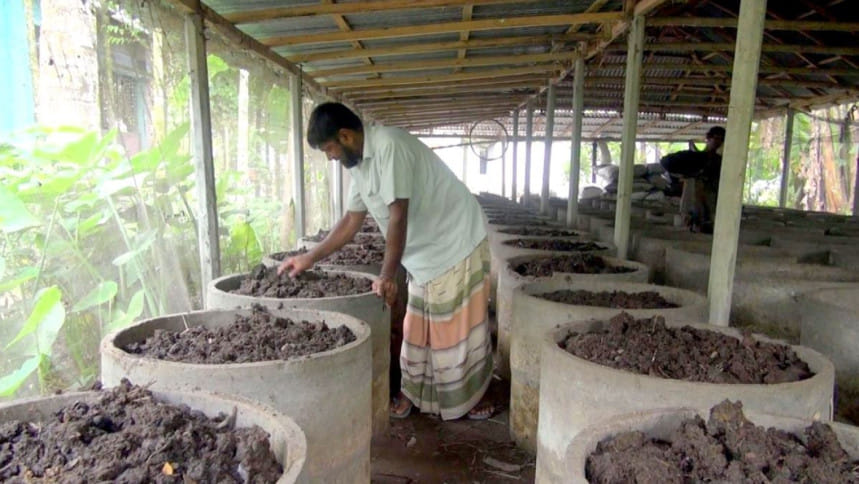Azizar, a pioneer in organic farming

In an interview in 2010, Ramnivas Agarwala, owner of Annapurna Organic Fertiliser Factory in Nilphamari, said, "Soil is the mother. Soil says you give me 10kg of seeds and one maund of fertiliser. In return, I give you 50 maunds of paddy and 50 maunds of straw. Have you ever wondered where it comes from? It comes from my own body. You do one thing; you keep the paddy and give me the straw. You are my children. I wonder what will happen to you when I (soil) will die. So, keep me alive for your own sake.'' The philosophical thoughts from Ramnivas inspired me.
During the time of the country's independence, our population was seven crores (70 million), and the number has gone up to over 17 crores (170 million) now.
All our food is being produced from the land we had since the liberation. It hasn't increased by an inch, rather, decreased further over the years.
To produce more crops from less land, we have put excessive pressure on the soil by applying chemical fertilisers. In the process, the soil loses its fertility, resulting in organic quality loss. In the meantime, although crop diversity has increased, farmers in our country are not aware of the proper use of fertiliser in different types of crops.
At the open-field discussion among farmers and policymakers 'Krishi Budget, Krishoker Budget (Farmers' Voices in Budget),' I asked the farmers whether they went for a soil test. Less than one percent of farmers said they did. Most disappointingly, not even five percent of farmers were aware of soil testing. But these people needed to know that organic matter is the life of the soil.
Five percent organic matter in the soil is required to maintain crop productivity. Unknowingly, they have been using excessive fertilisers and pesticides over the years. This has reduced the organic matter in the soil by one percent in most parts of the country, posing a major threat to food production for the growing populations.
I took a programme, 'Grow-Green' some years back to boost farmers toward use of organic fertilisers. Also, I wanted to highlight the success of those who practice organic farming.
Probably you would remember, Kaliganjpara village in Rangpur's Mithapukur upazila, which is known as an 'organic village' for decades. I showed their activities on Hridoye Mati O Manush as they were the pioneers in organic farming.
Since then, the use of vermicomposting (a natural process whereby earthworms convert waste material with rigid structures of compost) started extensively.
Farmer Azizar Rahman, like many others, was associated with the programme of making vermicompost on a very small scale. He used to apply the earthworm produced in his factory. Seeing good production of Azizar many farmers started using earthworms to make natural fertilisers for enhancing plant growth.
Soon Azizar realised that the production of earthworms could be a good business potential. Vermicompost contains 10 of the 16 essential plant nutrients.
According to research, organic matter is 28.32 percent, nitrogen 1.57 percent, phosphorus 1.26 percent, potassium 2.60 percent, calcium 2 percent, magnesium 0.66 percent, sulphur 0.74 percent, boron 0. 06 percent and iron 975, manganese 712, zinc 400 and copper 20 PPM.
Vermicompost can be applied to all types of crops. Usually, three to four tonnes are used per hectare for vegetables and other agricultural products, while five to 10kg is used for each fruit plant.
Farmers said with the use of vermicompost the yield has increased by 20 to 25 percent. Azizar said earthworms contributed to better soil health and fertility. Azizar now earns Tk 25,000 (USD 246.13) from his vermicompost factory every month.
Azizar built a factory on three decimals of land, spending Tk 2.5 lakh (USD 2461.07), and produces five to six tonnes of organic fertiliser every month.
The demand for his fertiliser is gradually increasing, not only in the surrounding areas. A small regional company regularly buys Azizar's fertiliser and sells those, using their brand name and packets.
Azizar has a dream to start his own organic fertiliser product in future. The use of organic fertilisers not only protects the soil's health, but it also reduces the need for chemical fertilisers.
When chemical fertilisers are witnessing a short supply worldwide, moderate use of chemical fertilisers along with organic fertilisers can ensure good yields. It would reduce the production cost as well.
Alongside the cultivation of fruits and vegetables, rooftop farming is also increasing across the country. In these cases, the use of vermicompost can play a huge role.
A number of companies have now come forward in organic fertilisers and vermicompost production. Azizar's factory can be an inspiration for many unemployed youths and entrepreneurs.
Besides, an employment sector can be created with a little investment that can contribute to sustainable agricultural development.

 For all latest news, follow The Daily Star's Google News channel.
For all latest news, follow The Daily Star's Google News channel. 



Comments